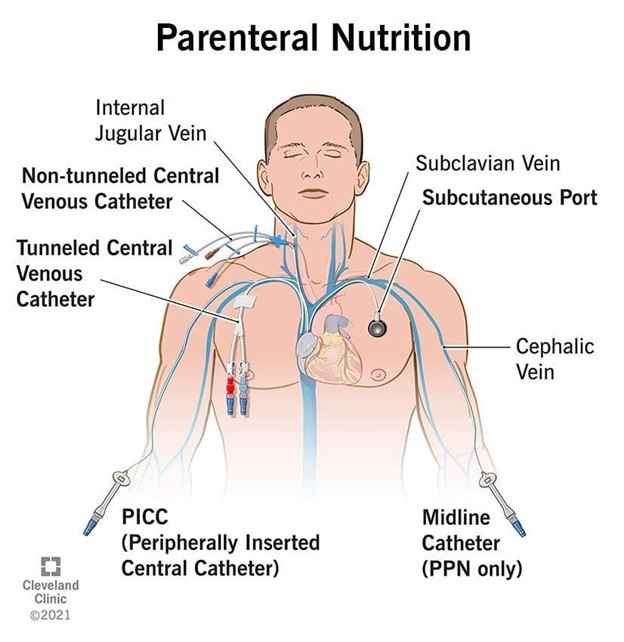A nurse is teaching a client who has a new prescription for total parenteral nutrition through a central line. Which of the following information should the nurse include in the teaching?
"I will change your IV tubing once every 48 hours."
"Abdominal distention is an expected effect of this therapy."
"I will need to check your gastric residual before administering feedings."
"I will need to measure your weight daily."
The Correct Answer is D

- A is incorrect because IV tubing for total parenteral nutrition should be changed every 24 hours to prevent infection.
- B is incorrect because abdominal distention is not an expected effect of total parenteral nutrition. It could indicate a complication such as fluid overload or bowel obstruction.
- C is incorrect because gastric residual is not relevant for total parenteral nutrition, which bypasses the gastrointestinal tract.
- D is correct because weight measurement is an important indicator of fluid balance and nutritional status for clients receiving total parenteral nutrition.
Nursing Test Bank
Naxlex Comprehensive Predictor Exams
Related Questions
Correct Answer is B
Explanation
Choice A rationale:
Shellfish allergies are not a contraindication to receiving the influenza vaccine. The vaccine contains no shellfish-derived ingredients.
Choice B rationale:
Egg allergies are a contraindication to receiving the influenza vaccine. Traditionally, most influenza vaccines are prepared using eggs and can provoke allergic reactions in individuals allergic to eggs. However, individuals with a mild egg allergy can often receive the vaccine under medical supervision. It is crucial to assess the severity of the egg allergy and consult with an allergist or immunologist before administering the vaccine.
Choice C rationale:
Gelatin allergies are generally not a contraindication to receiving the influenza vaccine. While some vaccines contain gelatin, it is not a component of all influenza vaccines. If the specific vaccine being administered contains gelatin, it should be avoided in individuals with a gelatin allergy.
Choice D rationale:
Milk allergies are not a contraindication to receiving the influenza vaccine. Milk or dairy products are not typically included in the influenza vaccine formulation.
Correct Answer is A
Explanation
Choice A rationale:
The nurse should suggest, "Give your son a little gift from his new sister," as a strategy to help the preschool-age son adjust to having a new sibling. This approach involves a small token or gift given from the newborn to the older sibling. It helps create a positive association and fosters a sense of connection and acceptance between the siblings. The gift symbolizes the new baby's arrival and can help the older child feel special and valued during this transition.
Choice B rationale:
While spending alone time with the new sister is important, the statement, "Give your son plenty of 'alone time' with his sister," does not address the initial meeting concerns. Alone time is relevant once the siblings have established a bond, but the initial introduction requires a more structured approach to ensure a smooth transition.
Choice C rationale:
Planning for the son to meet his sister for the first time at home is not the most suitable strategy. Hospitals provide a controlled environment with healthcare professionals available, ensuring the safety and well-being of both the mother and the newborn. The initial meeting should occur in a setting where medical assistance is readily accessible in case of any unforeseen circumstances.
Choice D rationale:
Holding the daughter when the son first meets her is a common and natural practice but does not actively involve the son in the process. Providing a gift from the baby to the older sibling fosters a sense of participation and inclusion, making the older child feel more involved and excited about the new sibling's arrival.
Whether you are a student looking to ace your exams or a practicing nurse seeking to enhance your expertise , our nursing education contents will empower you with the confidence and competence to make a difference in the lives of patients and become a respected leader in the healthcare field.
Visit Naxlex, invest in your future and unlock endless possibilities with our unparalleled nursing education contents today
Report Wrong Answer on the Current Question
Do you disagree with the answer? If yes, what is your expected answer? Explain.
Kindly be descriptive with the issue you are facing.
